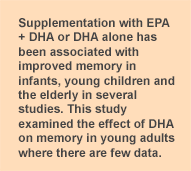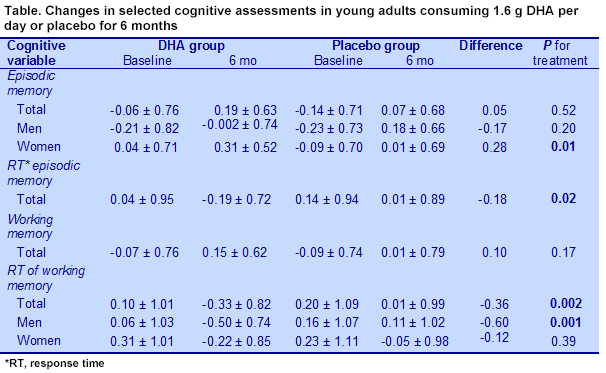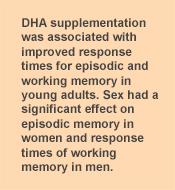
Higher concentrations of DHA in brain have been associated with improved memory performance in individuals with
mild cognitive impairment,
age-related cognitive decline,
preterm infants fed LC-PUFA-supplemented formula,
school-aged children with higher umbilical cord DHA concentrations and better cognitive performance in
non-demented elderly with memory complaints. Supplementation with EPA + DHA was also associated with significantly improved
working memory in a small sample of healthy young adults. In contrast to these reports, others have reported more rapid short-term memory loss with DHA supplementation in
young females and no effect in
healthy older adults or
older individuals supplemented with EPA + DHA. Much less is known about the effects of DHA in healthy young adults. To examine the effects of DHA supplementation on memory and other aspects of cognitive function in healthy young adults, investigators at Massey University, Auckland, NZ, recruited 228 nonsmoking adults aged 18 to 45 years, with low n-3 LC-PUFA intakes who were not taking any medications. Volunteers were randomly assigned to consume DHA (1.16 g DHA + 0.17 g EPA per day) or placebo (high-oleic acid sunflower oil) capsules for 6 months. Participants provided a fasting blood sample, demographic information and results from cognitive assessments using the
Computerized Mental Performance Assessment System, letter-number sequencing task subtest of the Wechsler Adult Intelligence Scale III and the Kit of
Factor-Referenced Cognitive Tests. All assessments were repeated at 6 months on the 176 participants who completed the study. The cognitive assessments reflected 7 domains: episodic memory, reaction time of episodic memory, working memory, reaction time of working memory, attention, reaction time of attention and processing speed. Secondary analyses included the effects of sex and
APOE genotype on the changes in memory scores. Comparisons between the DHA-treated and placebo groups by ANCOVA showed a significant effect of DHA on increased episodic memory in women, faster reaction time in episodic memory for the whole group and a quicker reaction time for working memory in the whole group and in men (Table). The analyses were adjusted for baseline cognitive function score, baseline DHA concentration, first language, age and education. There were no significant effects of DHA treatment on attention, the response time of attention or in processing speed.

In secondary analysis, sex was a significant factor in the DHA group for episodic memory and response time of working memory in women and men, respectively.
APOE genotype had no effect on treatment responses on any cognitive domains. However, there were significant interactions among
APOE status, sex and treatment. Male APOE4 carriers and noncarriers who consumed DHA had significantly improved response times for working memory compared with men in the placebo group. The effect of DHA treatment was particularly strong in the male APOE4 carriers for both response time of working memory and attention. These differences were due to shorter response times in the DHA-treated carriers and increased response times in the placebo carriers. Noncarriers were not affected by DHA treatment. Thus, male
APOE4 carriers were more responsive to DHA supplementation in their response times for working memory than noncarriers. However, there were only small numbers of APOE4 carriers.

These findings provide evidence that increased DHA consumption among healthy young adults with low n-3 LC-PUFA intakes is associated with improved response times for episodic and working memory. The study reported an effect of sex on some responses to DHA supplementation in both types of memory function. Attention and processing speed were unaffected by DHA supplementation. In the editorial accompanying this report, the authors questioned the study’s primary outcome and choice of cognitive assessments, which in their view left “considerable uncertainty for the reader.” Taken as described, the study fills in some of the age gaps in studies on DHA and cognitive performance from infancy and early childhood through the senior decades. One looks forward to future studies in healthy young adults with low fish intake that also address the points raised in the editorial. Stonehouse W, Conlon CA, Podd J, Hill SR, Minihane AM, Haskell C, Kennedy D. DHA supplementation improved both memory and reaction time in healthy young adults: a randomized controlled trial.
Am J Clin Nutr 2013;97:1134-1143. [
PubMed] Open Access Dangour AD, Allen E. Do omega-3 fats boost brain function in adults? Are we any closer to an answer? [Editorial]
Am J Clin Nutr 2013:97:909-910. [
PubMed] Open Access
Worth Noting Sumich AL, Matsudaira T, Heasman B, Gow RV, Ibrahimovic A, Ghebremeskel K, Crawford MA, Taylor E. Fatty acid correlates of temperament in adolescent boys with attention deficit hyperactivity disorder.
Prostaglandins Leukot Essent Fatty Acids 2013;88:431-436. [
PubMed] Montgomery P, Burton JR, Sewell RP, S psreckelsen TR, Richardson AJ. Low blood long-chain omega-3 fatty acids in UK children are associated with poor cognitive performance and behavior: A cross-sectional analysis from the DOLAB Study.
PLoS One 2013;8:e66697 [
PubMed] Open Access Quirk SE, Williams LJ, O'Neil A, Pasco JA, Jacka FN, Housden S, Berk M, Brennan SL. The association between diet quality, dietary patterns and depression in adults: a systematic review.
BMC Psychiatry 2013;13:175-196. [
PubMed] Open Access Parletta N, Cooper P, Gent DN, Petkov J, O’Dea K. Effects of fish oil supplementation on learning and behaviour of children from Australian Indigenous remote community schools: A randomized controlled trial.
Prostaglandins Leukot Essent Fatty Acids 2013;89:71-79. [
PubMed] Colombo J, Carlson SE, Cheatham CL, Shaddy DJ, Kerling EH, Thodosoff JM, Gustafson KM, Brez C. Long-term effects of LCPUFA supplementation on childhood cognitive outcomes.
Am J Clin Nutr 2013;98:403-412. [
PubMed] Open Access
 Higher concentrations of DHA in brain have been associated with improved memory performance in individuals with mild cognitive impairment, age-related cognitive decline, preterm infants fed LC-PUFA-supplemented formula, school-aged children with higher umbilical cord DHA concentrations and better cognitive performance in non-demented elderly with memory complaints. Supplementation with EPA + DHA was also associated with significantly improved working memory in a small sample of healthy young adults. In contrast to these reports, others have reported more rapid short-term memory loss with DHA supplementation in young females and no effect in healthy older adults or older individuals supplemented with EPA + DHA. Much less is known about the effects of DHA in healthy young adults. To examine the effects of DHA supplementation on memory and other aspects of cognitive function in healthy young adults, investigators at Massey University, Auckland, NZ, recruited 228 nonsmoking adults aged 18 to 45 years, with low n-3 LC-PUFA intakes who were not taking any medications. Volunteers were randomly assigned to consume DHA (1.16 g DHA + 0.17 g EPA per day) or placebo (high-oleic acid sunflower oil) capsules for 6 months. Participants provided a fasting blood sample, demographic information and results from cognitive assessments using the Computerized Mental Performance Assessment System, letter-number sequencing task subtest of the Wechsler Adult Intelligence Scale III and the Kit of Factor-Referenced Cognitive Tests. All assessments were repeated at 6 months on the 176 participants who completed the study. The cognitive assessments reflected 7 domains: episodic memory, reaction time of episodic memory, working memory, reaction time of working memory, attention, reaction time of attention and processing speed. Secondary analyses included the effects of sex and APOE genotype on the changes in memory scores. Comparisons between the DHA-treated and placebo groups by ANCOVA showed a significant effect of DHA on increased episodic memory in women, faster reaction time in episodic memory for the whole group and a quicker reaction time for working memory in the whole group and in men (Table). The analyses were adjusted for baseline cognitive function score, baseline DHA concentration, first language, age and education. There were no significant effects of DHA treatment on attention, the response time of attention or in processing speed. In secondary analysis, sex was a significant factor in the DHA group for episodic memory and response time of working memory in women and men, respectively. APOE genotype had no effect on treatment responses on any cognitive domains. However, there were significant interactions among APOE status, sex and treatment. Male APOE4 carriers and noncarriers who consumed DHA had significantly improved response times for working memory compared with men in the placebo group. The effect of DHA treatment was particularly strong in the male APOE4 carriers for both response time of working memory and attention. These differences were due to shorter response times in the DHA-treated carriers and increased response times in the placebo carriers. Noncarriers were not affected by DHA treatment. Thus, male APOE4 carriers were more responsive to DHA supplementation in their response times for working memory than noncarriers. However, there were only small numbers of APOE4 carriers.
Higher concentrations of DHA in brain have been associated with improved memory performance in individuals with mild cognitive impairment, age-related cognitive decline, preterm infants fed LC-PUFA-supplemented formula, school-aged children with higher umbilical cord DHA concentrations and better cognitive performance in non-demented elderly with memory complaints. Supplementation with EPA + DHA was also associated with significantly improved working memory in a small sample of healthy young adults. In contrast to these reports, others have reported more rapid short-term memory loss with DHA supplementation in young females and no effect in healthy older adults or older individuals supplemented with EPA + DHA. Much less is known about the effects of DHA in healthy young adults. To examine the effects of DHA supplementation on memory and other aspects of cognitive function in healthy young adults, investigators at Massey University, Auckland, NZ, recruited 228 nonsmoking adults aged 18 to 45 years, with low n-3 LC-PUFA intakes who were not taking any medications. Volunteers were randomly assigned to consume DHA (1.16 g DHA + 0.17 g EPA per day) or placebo (high-oleic acid sunflower oil) capsules for 6 months. Participants provided a fasting blood sample, demographic information and results from cognitive assessments using the Computerized Mental Performance Assessment System, letter-number sequencing task subtest of the Wechsler Adult Intelligence Scale III and the Kit of Factor-Referenced Cognitive Tests. All assessments were repeated at 6 months on the 176 participants who completed the study. The cognitive assessments reflected 7 domains: episodic memory, reaction time of episodic memory, working memory, reaction time of working memory, attention, reaction time of attention and processing speed. Secondary analyses included the effects of sex and APOE genotype on the changes in memory scores. Comparisons between the DHA-treated and placebo groups by ANCOVA showed a significant effect of DHA on increased episodic memory in women, faster reaction time in episodic memory for the whole group and a quicker reaction time for working memory in the whole group and in men (Table). The analyses were adjusted for baseline cognitive function score, baseline DHA concentration, first language, age and education. There were no significant effects of DHA treatment on attention, the response time of attention or in processing speed. In secondary analysis, sex was a significant factor in the DHA group for episodic memory and response time of working memory in women and men, respectively. APOE genotype had no effect on treatment responses on any cognitive domains. However, there were significant interactions among APOE status, sex and treatment. Male APOE4 carriers and noncarriers who consumed DHA had significantly improved response times for working memory compared with men in the placebo group. The effect of DHA treatment was particularly strong in the male APOE4 carriers for both response time of working memory and attention. These differences were due to shorter response times in the DHA-treated carriers and increased response times in the placebo carriers. Noncarriers were not affected by DHA treatment. Thus, male APOE4 carriers were more responsive to DHA supplementation in their response times for working memory than noncarriers. However, there were only small numbers of APOE4 carriers.  These findings provide evidence that increased DHA consumption among healthy young adults with low n-3 LC-PUFA intakes is associated with improved response times for episodic and working memory. The study reported an effect of sex on some responses to DHA supplementation in both types of memory function. Attention and processing speed were unaffected by DHA supplementation. In the editorial accompanying this report, the authors questioned the study’s primary outcome and choice of cognitive assessments, which in their view left “considerable uncertainty for the reader.” Taken as described, the study fills in some of the age gaps in studies on DHA and cognitive performance from infancy and early childhood through the senior decades. One looks forward to future studies in healthy young adults with low fish intake that also address the points raised in the editorial. Stonehouse W, Conlon CA, Podd J, Hill SR, Minihane AM, Haskell C, Kennedy D. DHA supplementation improved both memory and reaction time in healthy young adults: a randomized controlled trial. Am J Clin Nutr 2013;97:1134-1143. [PubMed] Open Access Dangour AD, Allen E. Do omega-3 fats boost brain function in adults? Are we any closer to an answer? [Editorial] Am J Clin Nutr 2013:97:909-910. [PubMed] Open Access Worth Noting Sumich AL, Matsudaira T, Heasman B, Gow RV, Ibrahimovic A, Ghebremeskel K, Crawford MA, Taylor E. Fatty acid correlates of temperament in adolescent boys with attention deficit hyperactivity disorder. Prostaglandins Leukot Essent Fatty Acids 2013;88:431-436. [PubMed] Montgomery P, Burton JR, Sewell RP, S psreckelsen TR, Richardson AJ. Low blood long-chain omega-3 fatty acids in UK children are associated with poor cognitive performance and behavior: A cross-sectional analysis from the DOLAB Study. PLoS One 2013;8:e66697 [PubMed] Open Access Quirk SE, Williams LJ, O'Neil A, Pasco JA, Jacka FN, Housden S, Berk M, Brennan SL. The association between diet quality, dietary patterns and depression in adults: a systematic review. BMC Psychiatry 2013;13:175-196. [PubMed] Open Access Parletta N, Cooper P, Gent DN, Petkov J, O’Dea K. Effects of fish oil supplementation on learning and behaviour of children from Australian Indigenous remote community schools: A randomized controlled trial. Prostaglandins Leukot Essent Fatty Acids 2013;89:71-79. [PubMed] Colombo J, Carlson SE, Cheatham CL, Shaddy DJ, Kerling EH, Thodosoff JM, Gustafson KM, Brez C. Long-term effects of LCPUFA supplementation on childhood cognitive outcomes. Am J Clin Nutr 2013;98:403-412. [PubMed] Open Access
These findings provide evidence that increased DHA consumption among healthy young adults with low n-3 LC-PUFA intakes is associated with improved response times for episodic and working memory. The study reported an effect of sex on some responses to DHA supplementation in both types of memory function. Attention and processing speed were unaffected by DHA supplementation. In the editorial accompanying this report, the authors questioned the study’s primary outcome and choice of cognitive assessments, which in their view left “considerable uncertainty for the reader.” Taken as described, the study fills in some of the age gaps in studies on DHA and cognitive performance from infancy and early childhood through the senior decades. One looks forward to future studies in healthy young adults with low fish intake that also address the points raised in the editorial. Stonehouse W, Conlon CA, Podd J, Hill SR, Minihane AM, Haskell C, Kennedy D. DHA supplementation improved both memory and reaction time in healthy young adults: a randomized controlled trial. Am J Clin Nutr 2013;97:1134-1143. [PubMed] Open Access Dangour AD, Allen E. Do omega-3 fats boost brain function in adults? Are we any closer to an answer? [Editorial] Am J Clin Nutr 2013:97:909-910. [PubMed] Open Access Worth Noting Sumich AL, Matsudaira T, Heasman B, Gow RV, Ibrahimovic A, Ghebremeskel K, Crawford MA, Taylor E. Fatty acid correlates of temperament in adolescent boys with attention deficit hyperactivity disorder. Prostaglandins Leukot Essent Fatty Acids 2013;88:431-436. [PubMed] Montgomery P, Burton JR, Sewell RP, S psreckelsen TR, Richardson AJ. Low blood long-chain omega-3 fatty acids in UK children are associated with poor cognitive performance and behavior: A cross-sectional analysis from the DOLAB Study. PLoS One 2013;8:e66697 [PubMed] Open Access Quirk SE, Williams LJ, O'Neil A, Pasco JA, Jacka FN, Housden S, Berk M, Brennan SL. The association between diet quality, dietary patterns and depression in adults: a systematic review. BMC Psychiatry 2013;13:175-196. [PubMed] Open Access Parletta N, Cooper P, Gent DN, Petkov J, O’Dea K. Effects of fish oil supplementation on learning and behaviour of children from Australian Indigenous remote community schools: A randomized controlled trial. Prostaglandins Leukot Essent Fatty Acids 2013;89:71-79. [PubMed] Colombo J, Carlson SE, Cheatham CL, Shaddy DJ, Kerling EH, Thodosoff JM, Gustafson KM, Brez C. Long-term effects of LCPUFA supplementation on childhood cognitive outcomes. Am J Clin Nutr 2013;98:403-412. [PubMed] Open Access


